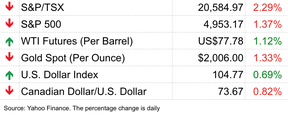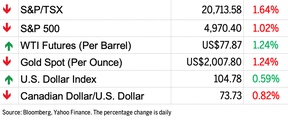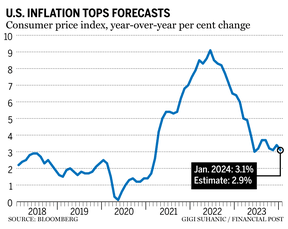Top headlines: TSX falls over 500 points, U.S. stocks plunge in market rout

The latest business news as it happens

Article content
Today’s headlines
Advertisement 2
Story continues below
Article content
Article content
Top story
TSX, U.S. markets retreat sharply as inflation shatters ‘hopes and dreams’
Stocks were rocked by hotter-than-expected U.S. inflation data Tuesday as financial markets brace for the possibility that the United States Federal Reserve may keep interest rates higher for longer than hoped.
The S&P 500 Index is down 1.6 per cent after core U.S. consumer prices climbed by most in eight months. If that drop holds into the close, it will mark the gauge’s worst CPI-day since 2022, according to data compiled by Bloomberg. The Dow Jones industrial average fell 1.88 per cent, while the Nasdaq composite dropped 2.24 per cent.
In Toronto, the S&P/TSX composite index was down 2.44 per cent, or 514.15 points.
“The concern (for bank stocks) is that the later the Fed begins with rate cuts, the greater the chance of a recession,” Wells Fargo’s Mike Mayo, the veteran banks stocks analyst, said by phone. “There’s very clear sentiment impact, and then the question is what degree does sentiment drive reality?”
Trading is turbulent as markets come to grips with the already-slim chances of the Fed lowering borrowing costs soon getting even slimmer. Indeed, these figures give the Fed ammunition to delay interest-rate cuts beyond what market was anticipating. Traders are responding, with swaps moving the pricing of rate cuts to July from June.
Advertisement 3
Story continues below
Article content
“There was a lot of hopes and dreams and hype in the market, and investors’ expectations will most likely reset after today’s CPI report,” Michael O’Rourke, chief market strategist at Jones Trading, said by phone. “It’s a notable step backwards, and you can’t ignore that. Today’s report pushed back everyone’s hopes for a rate cut to summer at best.”
The S&P 500 is approaching a technical roadblock after eclipsing 5,000 for the first time last week. The index is coming off five straight weeks of gains, rising in 14 of the last 15 weeks — something it hasn’t done since 1972.
— Bloomberg
4:40 p.m.
TSX tumbles almost 500 points, U.S. stock markets also fall

Canada’s main stock index lost more than two per cent on a broad-based decline, following U.S. markets as they slid on news that inflation in January was hotter than expected.
The S&P/TSX composite index closed down 482.33 points at 20,584.97.
In New York, the Dow Jones industrial average was down 524.63 points at 38,272.75. The S&P 500 index was down 68.67 points at 4,953.17, while the Nasdaq composite was down 286.95 points at 15,655.60.
Article content
Advertisement 4
Story continues below
Article content
The Canadian dollar traded for 73.77 cents U.S. compared with 74.35 cents U.S. on Monday.
The March crude oil contract was up 95 cents at US$77.87 per barrel and the March natural gas contract was down eight cents at US$1.69 per mmBTU.
The April gold contract was down US$25.80 at US$2,007.20 an ounce and the March copper contract was down a cent at US$3.71 a pound.
— The Canadian Press
4 p.m.
Oil rises as OPEC demand outlook helps push past technical level

Oil rose after a bullish demand outlook from OPEC helped crude surpass a key technical level that had served as the ceiling of this year’s narrow trading band.
West Texas Intermediate rose 1.5 per cent to top US$78 a barrel, pushing past its 200-day moving average of about US$77.40. With bulls also finding support from OPEC’s projections that global oil demand will continue strong growth this year, the breach above the technical threshold raises the possibility of additional upward momentum.
Crude prices also gathered support from the Standard & Poor’s 500 Index paring intraday losses. Still, broader risk-off sentiment capped crude’s gains after U.S. data showed inflation remains elevated, reducing the prospect of imminent interest rate cuts.
Advertisement 5
Story continues below
Article content
While oil has advanced this year, it’s yet to break decisively higher. The OPEC cuts, as well as nervousness over the conflict in the Middle East and attacks on shipping in the Red Sea, have largely been offset by an uncertain demand outlook and ample output from outside the group.
— Bloomberg
2:38 p.m.
B.C. launches $3 billion housing program, says private sector can’t solve crisis

British Columbia Premier David Eby says the private market can’t solve the province’s housing crisis, as his government launches an almost $3 billion public housing program to build more affordable rental units for middle-income earners.
The New Democrat government says the BC Builds program will target land owned by governments, community and non-profits and provide low-cost financing to fast-track rental property developments on underutilized lands in communities across the province.
Eby says the strategy stands in contrast to the “predictable” outcomes when government exited the housing market, “speculators ran wild” and prices and rents rose.
The government hasn’t provided estimates of the numbers of rental units it expects the program will develop, but says it has already identified 20 sites with the potential to build up to 4,000 rental units.
Advertisement 6
Story continues below
Article content
Eby says they are aiming for a concept-to-construction timeline of 12 to 18 months to build the housing, compared with the current three-to-five-year average to complete rental projects.
He says the BC Builds program is part of the NDP government’s housing strategy, which now totals $19 billion and includes last year’s initiatives to restrict short-term rentals, relax zoning regulations to permit more multi-residential housing developments and build more homes along transit corridors.
The BC Builds announcement comes just ahead of the start of its spring legislative session next week and the introduction of the government’s budget on Feb. 22, with a provincial election set for the fall.
— The Canadian Press
1:27 p.m.
Auto parts company Magna International announces share buyback plan

Magna International Inc. says it may buy back up to 300,000 of its common shares under its normal course issuer bid over the coming year.
The auto parts company says the bid will start on Thursday and will end no later than Feb. 14, 2025.
Magna says it may purchase the shares if it believes that the market price is attractive and that the purchase would be an appropriate use of corporate funds and in its best interests.
Advertisement 7
Story continues below
Article content
It had 286,780,238 issued and outstanding common shares as of Feb. 1.
Under Magna’s buy back plan announced in November 2022, the company bought 245,904 common shares by the time the plan ended on Nov. 14, 2023.
By buying back shares, a company spreads its profits over fewer shares. That increases its earnings per share, a key ratio used to determine a company’s financial health and investment rating.
— The Canadian Press
Noon
Midday markets: TSX falls almost 350 points as stocks rocked by U.S. inflation numbers

Canada’s main stock index was down almost 350 points in early afternoon trading in a broad-based decline, while U.S. stock markets also fell after a hotter-than-expected United States inflation report.
The S&P/TSX composite index was down 346.18 points, or 1.64 per cent, at 20,713.58.
In New York, the Dow Jones industrial average was down 444.47 points, 1.15 per cent, at 38,350.59. The S&P 500 index was down 51.38 points, 1.02 per cent, at 4,970.40, while the Nasdaq composite was down 225.78 points, 1.41 per cent, at 15,718.86.
The Canadian dollar traded for 73.73 cents US, down 0.82 per cent, compared with 74.35 cents US on Monday.
Advertisement 8
Story continues below
Article content
The March crude oil contract was up 1.24 per cent at US$77.87 per barrel and the March natural gas contract was down nine cents at US$1.68 per mmBTU.
The April gold contract was down 1.24 per cent at US$2,007.80 an ounce and the March copper contract was up less than a penny at US$3.73 a pound.
— The Canadian Press
11:00 a.m.
Cascades to close three plants, affecting 310 workers

Cascades Inc. is closing three plants as part of changes to its containerboard operations that will affect 310 employees.
The paper and packaging company says its corrugated medium mill in Trenton, Ont., that is currently idled will not restart operations, while converting plants in Belleville, Ont., and Newtown, Conn., will close by May 31.
It says it decided to close the facilities due to a combination of market conditions, higher operating costs, aging technology and the need for significant capital investment.
Cascades will work with the impacted employees to mitigate, where possible, the effect of the closures.
Employees who cannot or do not wish to relocate to other plants will receive support in their search for other employment, the company says.
Advertisement 9
Story continues below
Article content
Cascades will record $61 million in impairment and environmental obligation charges associated with the closures in the fourth quarter of its 2023 financial results as well as about $35 million in additional restructuring charges in the coming years.
— The Canadian Press
10:45 a.m.
Ottawa unveils more housing deals with cities across the country

Minister of Housing Sean Fraser says the federal government will roll out more than 60 housing agreements with small and rural communities across the country over the next few weeks.
Fraser said in a news conference this morning that the deals are worth $176 million and will help build more than 50,000 housing units over the next decade.
Ottawa has been signing agreements directly with municipalities through its housing accelerator fund, which offers money in exchange for changes to bylaws and regulations that would support more homebuilding.
The Liberal government has pitched the fund as a key pillar of its economic plan as it faces political pressure to address the country’s housing crisis.
Fraser says on top of the deals for smaller communities, the federal government has reached 36 agreements to date that will help construct more than 500,000 housing units over the next decade.
Advertisement 10
Story continues below
Article content
That includes a deal with the city of Ottawa worth $176 million announced on Monday.
— The Canadian Press
10:23 a.m.
Markets open: Stocks fall on inflation reality check

Wall Street got a reality check on Tuesday, with a hotter-than-estimated inflation data triggering a slide in both stocks and bonds.
Equities moved away from their all-time highs after the core consumer price index topped estimates and climbed the most in eight months. Treasuries sold off across the curve, with two-year yields hitting the highest since before the December United States Federal Reserve “pivot.” Fed swaps shifted the full pricing of a rate cut to July from June. And a measure of perceived risk in the U.S. investment-grade corporate bond market soared.
The consumer price index data came as a disappointment after a recent downdraft in price pressures that helped build expectations for rate cuts this year. Though the numbers give credence to the wait-and-see approach highlighted by Fed chair Jerome Powell and a drumbeat of central bank speakers.
In New York, the S&P 500 was down 1.44 per cent at 4,950.02. The Dow Jones industrial average fell 1.21 per cent to 38,327.85 while the Nasdaq composite was down 1.45 per cent 15,712.39
Advertisement 11
Story continues below
Article content
In Toronto, the S&P/TSX composite index fell 1.83 per cent 20,683.31.
— Bloomberg
9:32 a.m.
Tim Hortons parent Restaurant Brands reports Q4 profit and revenue up

Restaurant Brands International Inc. reported its fourth-quarter net income more than doubled compared with a year ago.
The parent company of Tim Hortons, Burger King and other brands, which keeps its books in U.S. dollars, says its net income totalled US$726 million or $1.60 per diluted share.
The result was up from US$336 million or 74 cents US per diluted share for the last three months of 2022.
The company says the increase was driven by a larger income tax benefit and increased income from operations, partially offset by higher interest costs.
On an adjusted basis, Restaurant Brands says it earned 75 cents US per diluted share in its most recent quarter, up from 72 cents US per diluted share a year earlier.
Revenue totalled US$1.82 billion, up from US$1.69 billion in the same quarter a year earlier.
— The Canadian Press
Tim Hortons parent doubles earnings on stronger sales
9 a.m.
U.S. inflation slows but remains high
Advertisement 12
Story continues below
Article content

Annual inflation in the United States cooled last month yet remained elevated in the latest sign that the pandemic-fuelled price surge is only gradually and fitfully coming under control.
Tuesday’s report from the Labor Department showed that the consumer price index rose 0.3 per cent from December to January, up from a 0.2 per cent increase the previous month. Compared with a year ago, prices are up 3.1 per cent.
That is less than the 3.4 per cent figure in December and far below the 9.1 per cent inflation peak in mid-2022. Yet the latest reading is still well above the United States Federal Reserve’s two per cent target level at a time when public frustration with inflation has become a pivotal issue in President Joe Biden’s bid for re-election
Excluding the volatile food and energy categories, so-called core prices climbed 0.4 per cent last month, up from 0.3 per cent in December and 3.9 per cent over the past 12 months. Core inflation is watched especially closely because it typically provides a better read of where inflation is likely headed. The annual figure is the same as it was in December.
Advertisement 13
Story continues below
Article content
— The Associated Press

8 a.m.
Shopify profit and sales narrowly beat estimates, but shares fall

Shopify Inc. reported sales and profit for the fourth quarter that narrowly beat analysts’ estimates, but that didn’t impress Wall Street after the stock more than doubled last year.
Revenue for the period rose 24 per cent to US$2.1 billion, beating the US$2.08-billion average estimate of analysts surveyed by Bloomberg. Profit, excluding one-time items, was 34 cents U.S. a share, above the 30-cent U.S. expectation.
Shopify fell about nine per cent in U.S. premarket trading. The company said it expects a free cash flow margin in the current quarter in the “high single digits,” while analysts were expecting 13.6 per cent. That miss “stands out as the only negative indicator and may be behind the stock dropping,” Anurag Rana, an analyst at Bloomberg Intelligence, wrote in a note.
Shopify said that revenue in the current quarter would grow at a “low-20s percentage rate.” The company said that would translate into a year-over-year rate in the mid-to-high twenties when adjusting for the sale of its logistics business.
Advertisement 14
Story continues below
Article content
The Ottawa-based company raised software prices for online merchants earlier this month, a move that’s expected to generate more than US$100 million in additional revenue this year without driving away many customers. Shopify is in its first year of a deal with Amazon.com Inc. to let merchants use its “Buy With Prime” delivery service. Shopify sold its own logistics business to freight-forwarding startup Flexport last year.
Gross merchandise volume, the overall value of merchant sales across Shopify’s systems, increased 23 per cent to US$75.1 billion, above Wall Street projections of US$71.6 billion.
— Spencer Soper, Bloomberg
Shopify tumbles after earnings fail to impress Wall Street
7:30 a.m.
BlackBerry to cut more jobs, close offices to contain costs

BlackBerry Ltd. says it’s taking action to streamline costs, including cutting jobs, as part of the ongoing process to separate two of its business divisions.
The Waterloo, Ont.-based technology company said last quarter it cut around 200 jobs as part of efforts to slash costs.
This quarter, the company said it anticipates further job losses within its cybersecurity business, which it expects to generate annualized savings of around US$27 million.
Advertisement 15
Story continues below
Article content
It’s also taking other steps to save money, including exiting six of its 36 global office locations.
The company said it expects to return to positive cash flow by the fourth quarter of its 2025 financial year.
BlackBerry reported a loss of US$21 million in its third quarter ended Nov. 30.
— The Canadian Press
7:30 a.m.
Stock markets before the opening bell

United States equity futures slumped before the release of keenly awaited inflation data that could set the stage for the timing of the Federal Reserve move to interest-rate cuts. Treasuries rose.
Contracts on the rate-sensitive Nasdaq 100 slid 0.6 per cent while those on the S&P 500 fell 0.4 per cent, extending Monday’s decline in the main U.S. stock gauge from a high of near 5,050. Nvidia Corp. dropped one per cent in premarket trading.
The inflation report, which is expected to show the first reading below three per cent on year-over-year headline inflation since March 2021, may not be enough to justify a more rapid shift to monetary easing. Employment, manufacturing and economic growth in the U.S. have surprised on the upside, proving resilient to the fastest rate increases in a generation.
Advertisement 16
Story continues below
Article content
“Despite expecting CPI to print below three per cent later, we still think the market is over-exuberant when it comes to when that first cut comes in,” Grace Peters, head of global investment strategy at JPMorgan Private Bank, said in an interview with Bloomberg TV.
The S&P/TSX composite index closed up 0.27 per cent on Monday.
— Bloomberg
What to watch today
The CRTC hosts a five-day hearing for its review of the wholesale high-speed access framework.
Finance Minister Chrystia Freeland will provide an update on the government’s economic plan in Ottawa in. Housing Minister Sean Fraser, Employment Minister Randy Boissonnault and Gudie Hutchings, minister of rural economic development, will join her.
The Financial Accountability Office of Ontario will release a report that provides an updated outlook for the provincial economy and the province’s finances on the website at fao-on.org/en. At 10 a.m. senior officials from the FAO will provide a brief presentation and answer technical questions.
Fresh U.S. inflation data drops this morning with the release of the consumer price index for January.
Advertisement 17
Story continues below
Article content
Companies reporting earnings today include Shopify Inc., Restaurant Brands International Inc., Hydro One Ltd., Coca-Cola Co., Airbnb Inc., Moody’s Corp. and Dream Industrial Real Estate Investment Trust.
Recommended from Editorial
Need a refresher on yesterday’s top headlines? Get caught up here.
Additional reporting by The Canadian Press, Associated Press and Bloomberg
Bookmark our website and support our journalism: Don’t miss the business news you need to know — add financialpost.com to your bookmarks and sign up for our newsletters here.
Article content







Comments